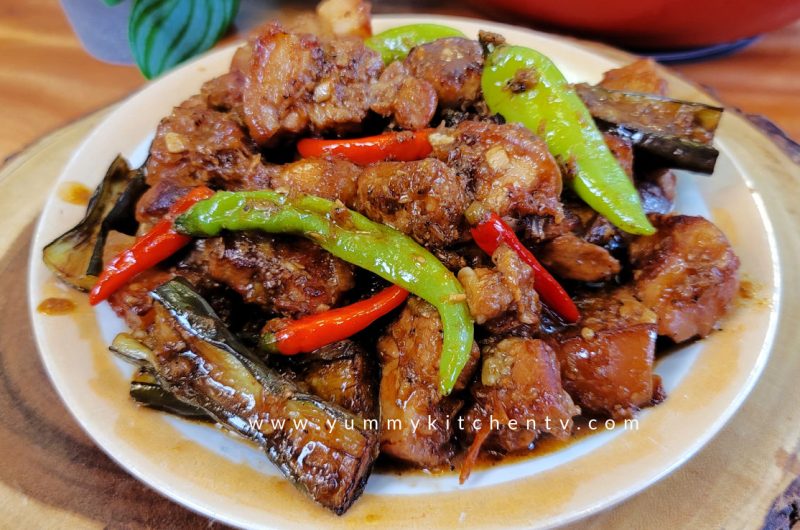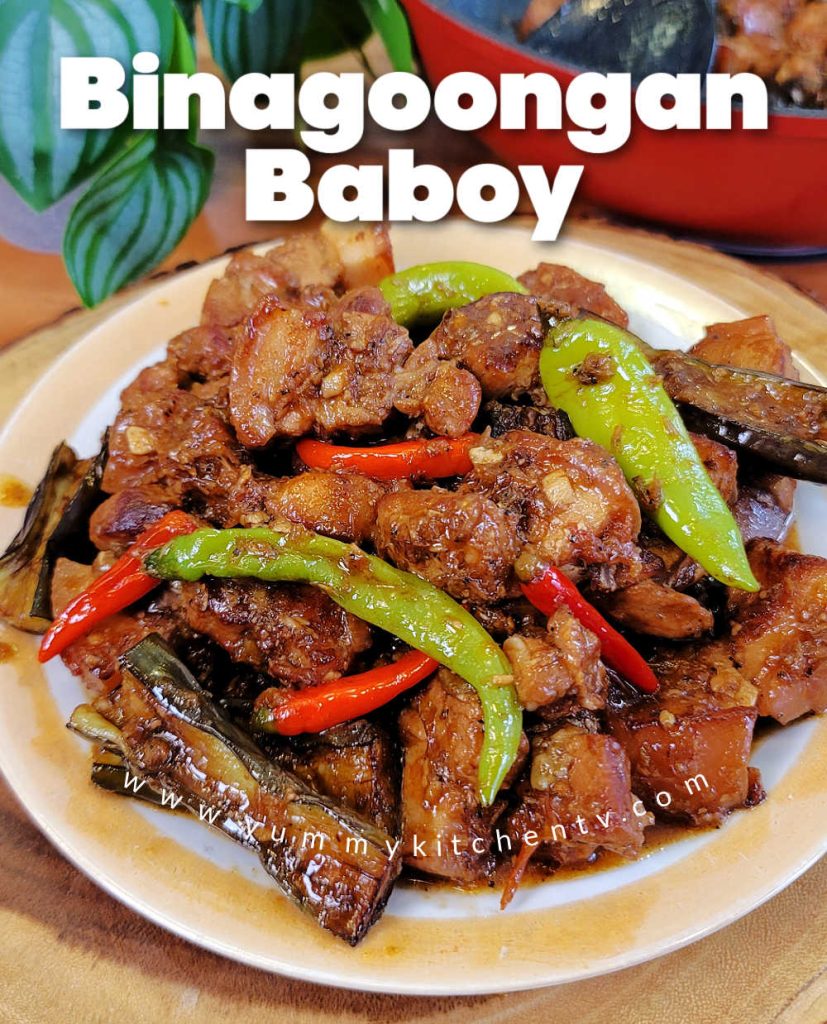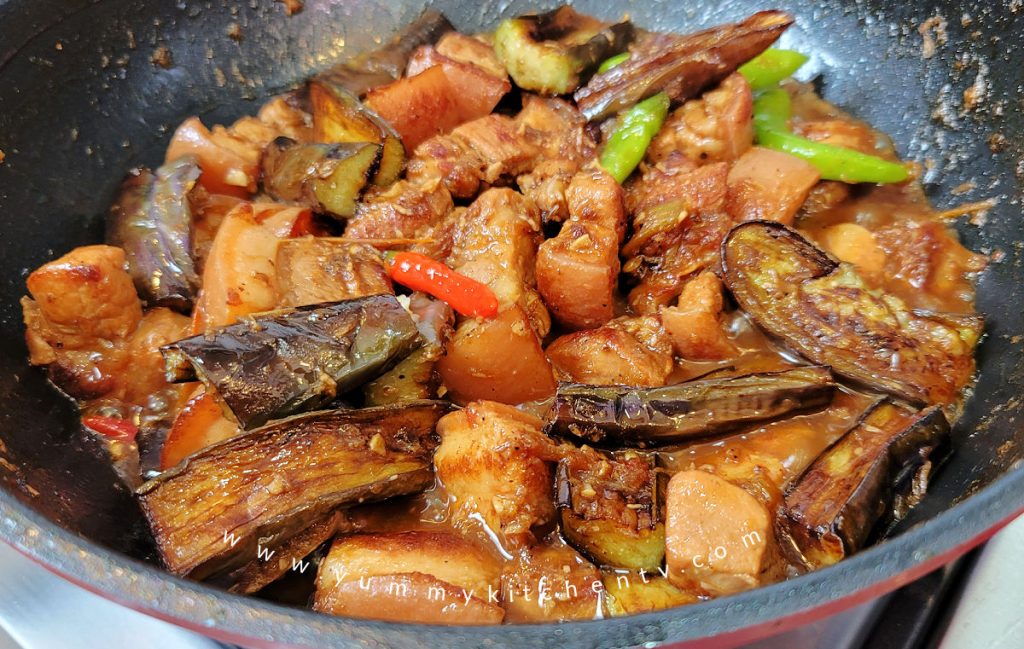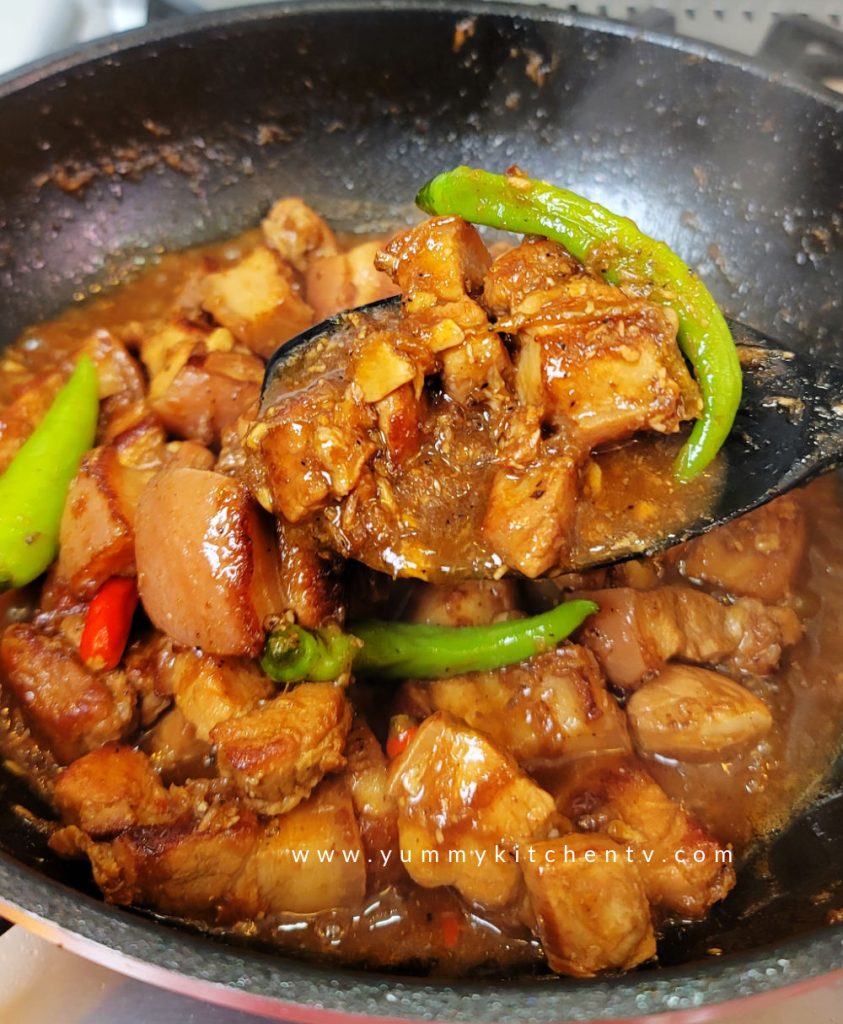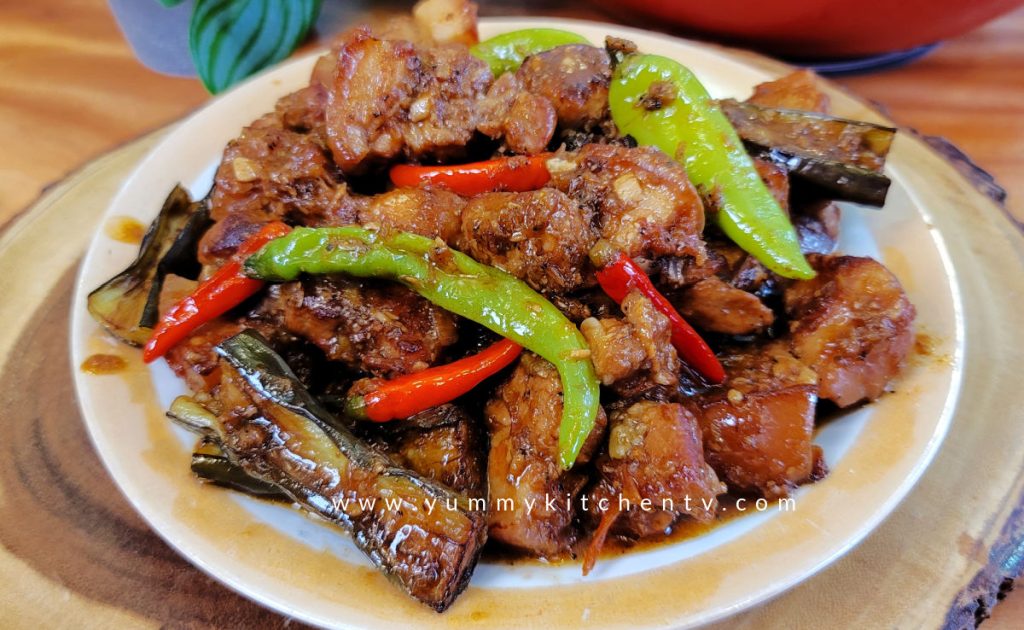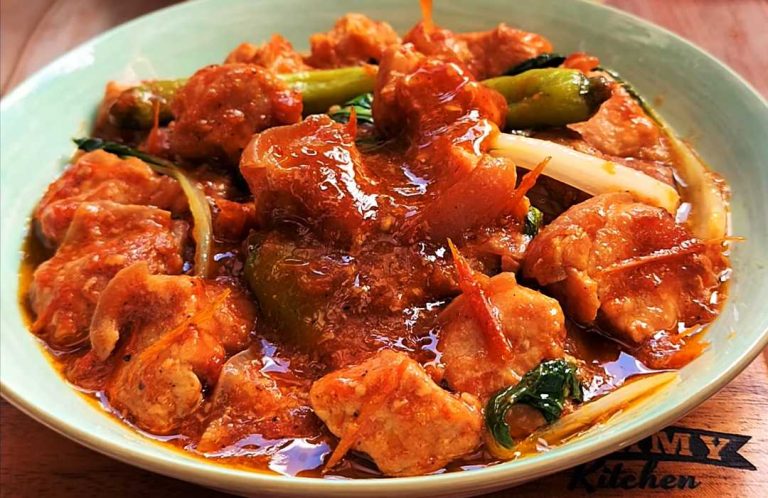Binagoongan Baboy: A Bold and Flavorful Filipino Favorite (Pork Binagoongan)
Binagoongan baboy or Binagoongang Baboy is a rich and savory Filipino dish that combines tender pork and the umami-packed goodness of bagoong (fermented shrimp paste). This classic recipe is elevated with the tang of tomatoes and the perfect hint of spice, making it a true crowd-pleaser. Best served with steamed rice, Binagoongan Baboy is a must-try dish for anyone who craves bold and authentic Filipino flavors.
#BinagoonganBaboy #FilipinoFoodie #PinoyRecipes #PorkBinagoongan #BagoongLovers #ComfortFood #AsianFlavor #RiceAndPork #FilipinoCuisine #HomeCooking
BINAGOONGAN BABOY RECIPE
Ingredients:
- 1 kilo pork belly (cut into slices)
- 4 tablespoons fresh alamang
- 5 cloves of garlic (chopped)
- 1 medium onion (chopped)
- 2 large tomatoes (chopped)
- 3 tablespoons vinegar
- 2 tablespoons soy sauce
- 1 tablespoon sugar
- pepper to taste
- red and green chilies
- fried eggplant (optional)
Directions:
- Wash the alamang to remove excess salt. Set aside.
- Heat a pan without any oil. Add the pork belly slices and sear for a few minutes until light brown and the oil starts to come out. Remove them from the pan and set aside.
- Using the oil from the pork, add the garlic, onions and tomatoes for a few minutes. Gently crush the tomatoes to release the liquid. Add the washed alamang and saute them all together for a few minutes.
- Pour the vinegar. Do not stir for 2 minutes. Once the raw taste of the vinegar evaporates, stir and saute for a few minutes. Add the seared pork and toss gently.
- Season with some pepper and add some soy sauce for color.
- Pour 2 – 3 cups of water to cook the pork. Cover the pot and let it simmer for 30 – 45 minutes or until the pork is tender.
- While waiting, you can fry some sliced eggplant (optional step).
- After 45 minutes, add some sugar and the red and green chilies. Mix well to incorporate the flavors and cook until the sauce is reduced. Add the fried eggplant and stir well to coat with the sauce. Turn the heat off.
- Transfer the pork binagoongan to a serving plate. Enjoy this with a big bowl of hot steaming rice. Yum!
WHAT IS BAGOONG ALAMANG ?
If there is one condiment we should exceptionally be proud of, it would be the bagoong alamang. If there’s ube and cheese, there is always bagoong alamang to green unripe mangoes. While we enjoy its unique salt and savoury taste, do you know what a bagoong alamang is?
Aside from being the mango pairing, the bagoong alamang can also be used as a condiment in cooking, just like the oyster sauce, soy sauce, etc. In the recipe featured in this article, you’ll see the magic that will bloom once the sauteed alamang meets our meaty pork slices.
Bagoong alamang is commonly sold in jars next to condiments and green mangoes. It is a condiment made from small shrimps which are processed and preserved. They are fermented in a brine solution for around 6 months and are colored pink using food coloring. They are either sold fresh or already sauteed one.
The fresh alamang has a really intense salty shrimp flavor while the sauteed one is the real deal, having already flavored with some aromatics and seasonings.
Bagoong alamang is not just for mangoes, it’s for ulam too! Yum!
BINAGOONGAN BABOY
Making bagoong alamang might be a business or a hobby to some, while for me, it’s both. Just looking at a picture of a green mango dipped in spicy alamang will automatically make the whole universe drool. To prevent this drooling, I created a bunch of alamang in jars which was initially made for my own consumption, but then turned into a side hustle. This can be a good idea if you want to start a small business.
While I always assume that everyone loves alamang, I know a person who does not like it. He told me it was because of its extreme taste and flavor which he could not handle. I knew it was my fault when I handed him a half a mango with an exaggerated amount of alamang, not knowing it will cause him not to like him.
When he went to our house for a visit, all I remember was I needed to give the bagoong alamang another chance. #RedemptionTime Without having a second thought, pork binagoongan will be our meal for the day. Watching him have the first bite, he commented that the smell and flavor was oddly familiar but he is not sure. After he finished the meal, I then revealed that it was the bagoong alamang which made his ulam extravagant and toothsome.
If you know someone who does not like bagoong alamang for a reason, try preparing them some pork binagoongan using the quick steps below. Happy cooking!
HOW TO MAKE BINAGOONGAN BABOY
Making binagoongan baboy is as simple as any other pork recipes. And what makes this dish special is the use of sauteed bagoong alamang to enhance the saltiness and savoury flavor of the whole dish.
To prepare this dish, start with choosing the right type of pork. The best cut to use is the pork belly or liempo. This cut has equal parts of both lean and fatty meat, since our dish specifically wants natural oils to render.
The alamang we want to use for this dish is the fresh alamang (the pink one). While you can also opt to use the sauteed version, the fresh alamang in this recipe will be sauteed with the pork for later. The fresh alamang is super salty as it is processed and preserved to increase its shelf life. Your dish will be overly salty if you will not wash it a few times before using. Around two to three times of washing is enough.
Once all the ingredients are prepared, let’s start cooking!
Sear the pork belly slices until the oil renders. This oil will be used as the base of our aromatics when sauteed. Aside from the usual garlic and onion, add some tomatoes for acidity. Gently crush the tomatoes to release the liquid. Lastly, add the fresh alamang, and saute them all. Some people like their alamang just sauteed lightly, while some wait for a few minutes until the alamang becomes a little brown.
Add the vinegar for extra acidity (you know how oily this dish would be!). Remember no to stir right away, since doing this will give your dish a bitter taste due to the raw taste of the vinegar. To fully cook the pork, add water to simmer them. This step may take around more than half an hour. If you want to add veggies to this dish, you can fry some eggplant for the meantime and just add it later during the final touches.
Add the final flavors by adding your red and green chilies, balanced with the sweetness of a little sugar. Some recipes uses a little coconut sauce for a silky and creamy texture and it’s up to you! Add your fried eggplant and your pork binagoongan is ready to be devoured!
I really love my pork binagoongan spicy, and on top of a big bowl of hot steaming rice. Yum!
Paano Magluto ng Binagoongan Baboy
Mga Sangkap:
- 1 kilo liempo (hiniwa)
- 4 kustara sariwang alamang
- 5 butil ng bawang (hiniwa)
- 1 sibuyas (hiniwa)
- 2 malalaking kamatis (hiniwa)
- 3 kutsarang suka
- 2 kutsarang toyo
- 1 kutsarang asukal
- paminta
- siling labuyo
- pritong talong (optional)
Paano Lutuin:
- Hugasan ang alamang ng ilang beses para mabawasan ang alat nito. Isantabi.
- Painitin ang kawali (walang mantika). Ilagay ang liempo at lutuin ito ng ilang minuto hanggang magmantika at maging brown. Alisin ang mga ito sa kawali at isantabi muna.
- Gamit ang pinagmantikaan ng baboy, igisa ang sibuyas, bawang at kamatis ng ilang minuto. Medyo durugin ang mga kamatis para lumabas ang katas nito. Ilagay ang hinugasang alamang at igisa ang mga ito ng ilang minuto.
- Ilagay ang suka. Wag munang hahaluin ng 2 minuto para mawala ang matapang na amoy ng suka. Saka ito haluin ng ilang minuto bago ibalik ang baboy. Haluin ito ng mabuti.
- Timplahan ito ng paminta at lagyan ng konting toyo para magkaron ng kulay.
- Maglagay ng 2 – 3 tasa ng tubig para maluto ang baboy. Takpan ang kawali at hayaan itong maluto ng 30 – 45 minuto hanggang lumambot.
- Habang naghihintay, pwede kang magprito ng talong (optional).
- Pagkatapos ng 45 minuto, timplahan ito ng konting asukal. Ilagay na rin ang mga sili. Haluin ito ng mabuti at hayaang maluto hanggang lumapot ang sauce. Huling ilagay ang pirnitong talong at haluin ng konti bago patayin ang apoy.
- Ilipat ang pork binagoongan sa serving plate. Kainin ito kasama ng malaking bowl ng mainit na kanin. Yum!


